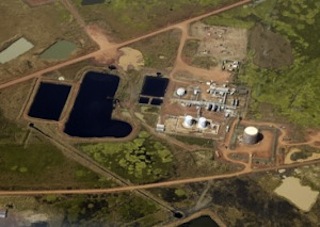Khartoum rules out amending 2014 budget over crisis in S. Sudan
December 23, 2013 (KHARTOUM) – Sudan has no intention of amending the 2014 draft budget to account for the possibility of oil flow disruption from South Sudan as a result of the clashes that affected production areas.

In 2013, Sudan expects to receive around $500 million in transit fees since oil production was restarted in June after more than a year of suspension.
Sudan’s economy was hit hard since the southern part of the country declared independence in July 2011, taking with it about 75% of the country’s oil output.
However the transit fees are expected to plug part of the budget hole caused by the loss of oil reserves.
Babiker Mohamed Tom, member of Sudan’s parliamentary subcommittee on Finance and Economy, noted that the transit fees account for only 5% of the budget.
Should any issues stop the oil flow from South Sudan, then the government in Khartoum can cut spending to the maximum extent possible in order to adjust.
Forces loyal to deposed South Sudanese Vice President Riek Machar has taken control of oil-rich Unity state.
In an exclusive interview with Sudan Tribune on Monday, Machar revealed a plan to halt oil revenue remittances to Juba.
He said no money would go to the government in Juba, explaining that his group plans to divert oil revenues and deal directly with Sudan in implementing the September 2012 cooperation agreements, as they are in control of the concerned states.
“We will establish an extra account to which the oil revenues will be remitted for the economic interest of the people of South Sudan”, said Machar, adding that Juba will be isolated until his group takes over power from president Salva Kiir.
Daniel Howden from the Economist magazine said on Twitter last week that Chinese oil workers evacuated at Juba airport told him that “our [oil companies] HQ instructed us to close the wells (Unity State), the oil fields are shut down. All of them”.
The India-based Economic Times said that New Delhi evacuated all of its oil employees from South Sudan including all 11 executives working on 40,000 barrels per day Greater Nile Oil Project and Block 5A.
Before departure, the last job the Indian executives did was to shut down the oilfields, the Economics Times reported. The rebels have not yet taken control of the oilfields but the move was done as a precaution.
ONGC Videsh Ltd, the overseas arm of state-owned Oil and Natural Gas Corp (ONGC) made all arrangements to evacuate its personnel as rebel forces loyal to Machar captured Unity state which housed most of the fields it was operating.
OVL owns 25 per cent stake in the Greater Nile Oil Project which produces about 40,000 barrels of oil per day and 24.125 per cent in Block 5A that produced 5,000 bpd.
Other partners in the blocks – China’s CNPC and Petronas of Malaysia too have decided to evacuate their officials from South Sudan, the source said.
South Sudanese officials insist however that oil production is proceeding normally.
(ST)
